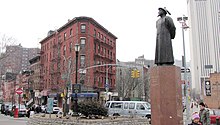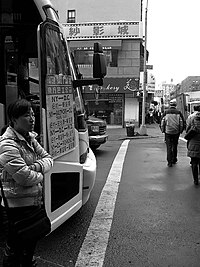East Broadway (Manhattan)
[26] In 2014, Sing Tao Daily reported that "the population of new immigrants, especially those from Fujian province, is much smaller compared to 10 years ago.
"[28] Affordable-housing advocates view landlords "who deliberately make their own buildings unlivable, through vandalism, harassment, nuisance construction, legal intimidation, and outright threats, as a way to drive out rent-stabilized tenants and charge 'market rate' for their units" as a major problem in the neighborhood,[29] with some landlords being investigated over such efforts.
[30][31][32] The local publication Downtown Express reported that "illegally subdivided, single-room occupancy units are common in Chinatown and other parts of the city where low-income tenants are willing to live in poor conditions in exchange for inexpensive rents.
"[33] In a July 2018 report from Voices of NY, Fuzhou owned businesses have been declining on East Broadway due to the rents being too expensive and now there are many empty storefronts on the street.
East Broadway has now become a lot quieter with fewer people walking around as a result of these factors in addition to the fact that large numbers of Fuzhou speakers are moving out of Manhattan's Chinatown and the presence of high income professionals often non-Asian as well as high end hipster businesses are now increasingly growing in the area.
In 1911, the Florence theater with 980 seats opened under the Manhattan Bridge on 75–85 East Broadway showing Yiddish entertainment.
At one time in 1941 Claude Lévi-Strauss witnessed their performance while he was in New York serving as a cultural adviser for the French Embassy.
Once they discontinued during May 1950, the over-half-century-long tradition of Cantonese opera performances ended in the Chinatown neighborhood and then the Sun Sing theater during the same year began to feature Chinese films with English subtitles included sometimes.
Paul R. Screvane, president of the City Council at the time was invited as a guest of honor to the ceremony on the opening of the theater.
There was also a room facility where there was a coffee bar selling Chinese and American food products with a color television set.
Michael Chen, a leader of the Flying Dragons of the 70s in Manhattan's Chinatown was convicted and later acquitted for those charges of that incident and he was eventually murdered in 1982.
At the time, gang violence was very prevalent in the Chinatown neighborhood including the rivalry of the Ghost Shadows and Flying Dragons.
After it was closed, there was one plan by a local builder to build a hotel in the location, but it was later realized that it would not work due to not having the financial resources.
Since the 2000s and especially since the 2010s, gentrification has been rapidly increasing in the area, which played a very large role in these trends to decline as well this also affected the rent prices of the storefront spaces to continuously go up becoming increasingly unaffordable to rent resulting in many of the businesses to move out causing a large influx of them to now be empty and often the new businesses that would take over the spaces would stay only a short period and then close.
[23][68][69] In the past during the 2000s, there have been accusations against the East Broadway Mall operators for mistreating their storefront tenants such as illegally raising their rents, being prejudiced against the Fuzhou storefront owners, and trying to gentrify the mall and as well as there have been accusations against the 88 Palace Restaurant managers for mistreating the Fuzhou workers by taking their tips, berating them, and giving them responsibilities that they were not supposed to be assigned to, which then led to lawsuits and the restaurant managers retaliated against them by threatening to terminate them since many of the Fuzhou workers lacked legal residency statuses.
[77][78][79][58] On October 25, 2021, WABC-TV reported that East Broadway Mall was in danger of closing due to increasing rents and property values, which were exacerbated during the pandemic when tenants left.
[43][80] In November 2021, the media reported that the New York State Government provided $20 million in grant money to revitalize a few city-owned grounds in the Two Bridges section such as Chatham Square/KimLau Square, Forsyth Plaza just at the ground level of Manhattan Bridge and including the East Broadway Mall.
Like East Broadway Mall, they were once populated primarily by Fuzhou style storefronts during the 2000s including having a large number of Fuzhou Chinese customers from the local neighborhood and from other parts of the city including from outside of New York State frequenting and shopping at this mini mall contributing very great prosperity just like the East Broadway Mall, but since the 2010s, vacancies slowly began to increase as a result of gentrification and increasing property values/rent as well as the continuous migration of Chinese Fuzhou speakers from the neighborhood with many relocating to the newer and much larger Fuzhou community in Sunset Park Brooklyn and with the Fuzhou Chinese speakers coming from other parts of the city and from out of New York State that once frequented East Broadway for commerce and errands have largely shifted to Sunset Park Brooklyn's newer and much larger Fuzhou community for all of these needs, this has contributed to a dramatic decline in customers to this mall meeting a very similar fate like East Broadway Mall and for a certain period of time in the 2010s, their whole entire second floor's storefronts were empty until in 2016 when a potential non-Asian business owner name Simon Gabriel was trying to search for a low rent location in downtown Manhattan to open up a music store after the store he worked in called, Other Music for 20 years in the East Village at E. 4th Street closed down and upon coming across Oriental Plaza mini mall and meeting with the mall's operators, Winking Group, he became the first non-Asian person to rent a storefront on the second floor opening up his music shop named 2 Bridges Music Art.
Very soon, this attracted a very large influx of Non-Asian professional artists and clothing designers to open up shops on the second floor eventually transforming the whole entire second floor into a gentrified artist and fashion business district and often hosting fashion and cultural art events, which Simon Gabriel expressed discontent that his own arrival to this mini mall attracted large numbers of professional artists to demand renting these storefronts causing the rental property values to go up, which affected his rent to go up as it was his original intention to have an affordable storefront rent at the location.
There was an incident where a transgendered white woman who works at the storefront in the mall was using the woman's bathroom, which created conflicts with two middle aged female Chinese workers when they were also using the same bathroom uncomfortably scaring them, which resulted in one of the Chinese shopkeepers who could speak English to have to step in to translate and defuse the situation and this is one of the examples of the social and cultural conflicts that happened at this mini mall.
However, with the increasing gentrification in the neighborhood and now with this mall already half gentrified, this is leading to the likelihood that the demographics of the shopkeepers including customers may continuously shift to majority Non-Asians eventually in the future.
[88][89][90] The Jewish Daily Forward erected a ten-story office building at 175 East Broadway, designed by architect George Boehm and completed in 1912.
[96][97] Seward Park, at the northeast corner of East Broadway and Straus Square, is 3.046 acres (12,330 m2) in size and is the first municipally built playground in the United States.




